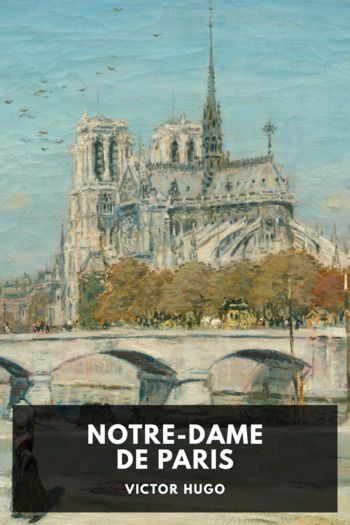Notre-Dame de Paris - Victor Hugo (diy ebook reader .txt) 📗

- Author: Victor Hugo
Book online «Notre-Dame de Paris - Victor Hugo (diy ebook reader .txt) 📗». Author Victor Hugo
Let the reader picture to himself now, this immense, oblong hall, illuminated by the pallid light of a January day, invaded by a motley and noisy throng which drifts along the walls, and eddies round the seven pillars, and he will have a confused idea of the whole effect of the picture, whose curious details we shall make an effort to indicate with more precision.
It is certain, that if Ravaillac had not assassinated Henri IV, there would have been no documents in the trial of Ravaillac deposited in the clerk’s office of the Palais de Justice, no accomplices interested in causing the said documents to disappear; hence, no incendiaries obliged, for lack of better means, to burn the clerk’s office in order to burn the documents, and to burn the Palais de Justice in order to burn the clerk’s office; consequently, in short, no conflagration in 1618. The old Palais would be standing still, with its ancient grand hall; I should be able to say to the reader, “Go and look at it,” and we should thus both escape the necessity—I of making, and he of reading, a description of it, such as it is. Which demonstrates a new truth: that great events have incalculable results.
It is true that it may be quite possible, in the first place, that Ravaillac had no accomplices; and in the second, that if he had any, they were in no way connected with the fire of 1618. Two other very plausible explanations exist: First, the great flaming star, a foot broad, and a cubit high, which fell from heaven, as everyone knows, upon the law courts, after midnight on the seventh of March; second, Théophile’s quatrain—
“Sure, ’twas but a sorry game
When at Paris, Dame Justice,
Through having eaten too much spice,
Set the palace all aflame.”
Whatever may be thought of this triple explanation, political, physical, and poetical, of the burning of the law courts in 1618, the unfortunate fact of the fire is certain. Very little today remains, thanks to this catastrophe—thanks, above all, to the successive restorations which have completed what it spared—very little remains of that first dwelling of the kings of France—of that elder palace of the Louvre, already so old in the time of Philip the Handsome, that they sought there for the traces of the magnificent buildings erected by King Robert and described by Helgaldus. Nearly everything has disappeared. What has become of the chamber of the chancellery, where Saint Louis consummated his marriage? the garden where he administered justice, “clad in a coat of camelot, a surcoat of linsey-woolsey, without sleeves, and a sur-mantle of black sandal, as he lay upon the carpet with Joinville?” Where is the chamber of the Emperor Sigismond? and that of Charles IV? that of Jean the Landless? Where is the staircase, from which Charles VI promulgated his edict of pardon? the slab where Marcel cut the throats of Robert de Clermont and the Marshal of Champagne, in the presence of the dauphin? the wicket where the bulls of Pope Benedict were torn, and whence those who had brought them departed decked out, in derision, in copes and mitres, and making an apology through all Paris? and the grand hall, with its gilding, its azure, its statues, its pointed arches, its pillars, its immense vault, all fretted with carvings? and the gilded chamber? and the stone lion, which stood at the door, with lowered head and tail between his legs, like the lions on the throne of Solomon, in the humiliated attitude which befits force in the presence of justice? and the beautiful doors? and the stained glass? and the chased ironwork, which drove Biscornette to despair? and the delicate woodwork of Hancy? What has time, what have men done with these marvels? What have they given us in return for all this Gallic history, for all this Gothic art? The heavy flattened arches of M. de Brosse, that awkward architect of the Saint-Gervais portal. So much for art; and, as for history, we have the gossiping reminiscences of the great pillar, still ringing with the tattle of the Patru.
It is not much. Let us return to the veritable grand hall of the veritable old palace. The two extremities of this gigantic parallelogram were occupied, the one by the famous marble table, so long, so broad, and so thick that, as the ancient land rolls—in a style that would have given Gargantua an appetite—say, “such a slice of marble as was never beheld in the world”; the other by the chapel where Louis XI had himself sculptured on his knees before the Virgin, and whither he caused to be brought, without heeding the two gaps thus made in the row of royal statues, the statues of Charlemagne and of Saint Louis, two saints whom he supposed to be great in favor in heaven, as kings of France. This chapel, quite new, having been built only six years, was entirely in that charming





Comments (0)